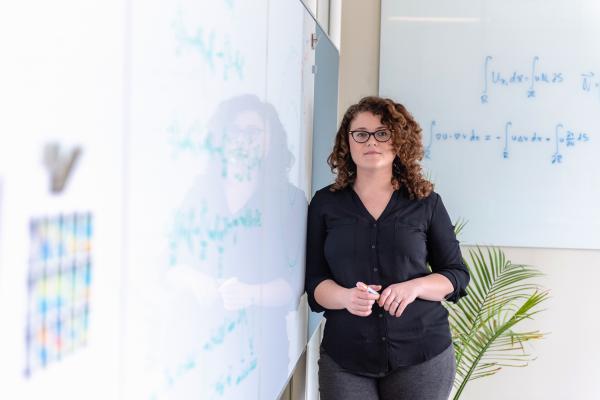Eva Dyer, a researcher in the Petit Institute for Bioengineering and Bioscience at the Georgia Institute of Technology, is the recipient of a $175,000 award from the National Science Foundation (NSF).
Dyer, who is an assistant professor in the Wallace H. Coulter Department of Biomedical Engineering at Georgia Tech and Emory University, was awarded through NSF’s CRII program – the Computer and Information Science and Engineering Research Initiative. Sometimes referred to as the “Mini CAREER Award,” the program encourages research independence early in a faculty member’s career.
The aim of her project, entitled “Using Large-Scale Neuroanatomy Datasets to Quantify the Mesoscale Architecture of the Brain,” is to develop new computational approaches for modeling the connectivity of the mouse brain, in order to reveal principles of wiring and information routing.
As Dyer explains, “Methods for revealing the global connections of the brain typically start by tracing a small number of neurons at a time. It is through performing many experiments, in different brain areas and across many brains, that information can be aggregated and consolidated to produce detailed maps of the brain’s global networks and architecture.”
Her project will leverage whole-brain imaging datasets from the Allen Institute for Brain Science. Each dataset provides a small piece of the puzzle. But, when combined, they can yield a picture of whole-brain connectivity.
“The outcomes of this research will be new maps of the global connectivity of the mouse brain, and a framework for studying the impact of disease and aging on whole-brain networks,” Dyer says.
Media Contact
Keywords
Latest BME News
Commercialization program in Coulter BME announces project teams who will receive support to get their research to market.
Courses in the Wallace H. Coulter Department of Biomedical Engineering are being reformatted to incorporate AI and machine learning so students are prepared for a data-driven biotech sector.
Influenced by her mother's journey in engineering, Sriya Surapaneni hopes to inspire other young women in the field.
Coulter BME Professor Earns Tenure, Eyes Future of Innovation in Health and Medicine
The grant will fund the development of cutting-edge technology that could detect colorectal cancer through a simple breath test
The surgical support device landed Coulter BME its 4th consecutive win for the College of Engineering competition.
New research from Georgia Tech helps doctors predict how therapies will interact with a child's immune system, potentially improving outcomes and reducing risks.








